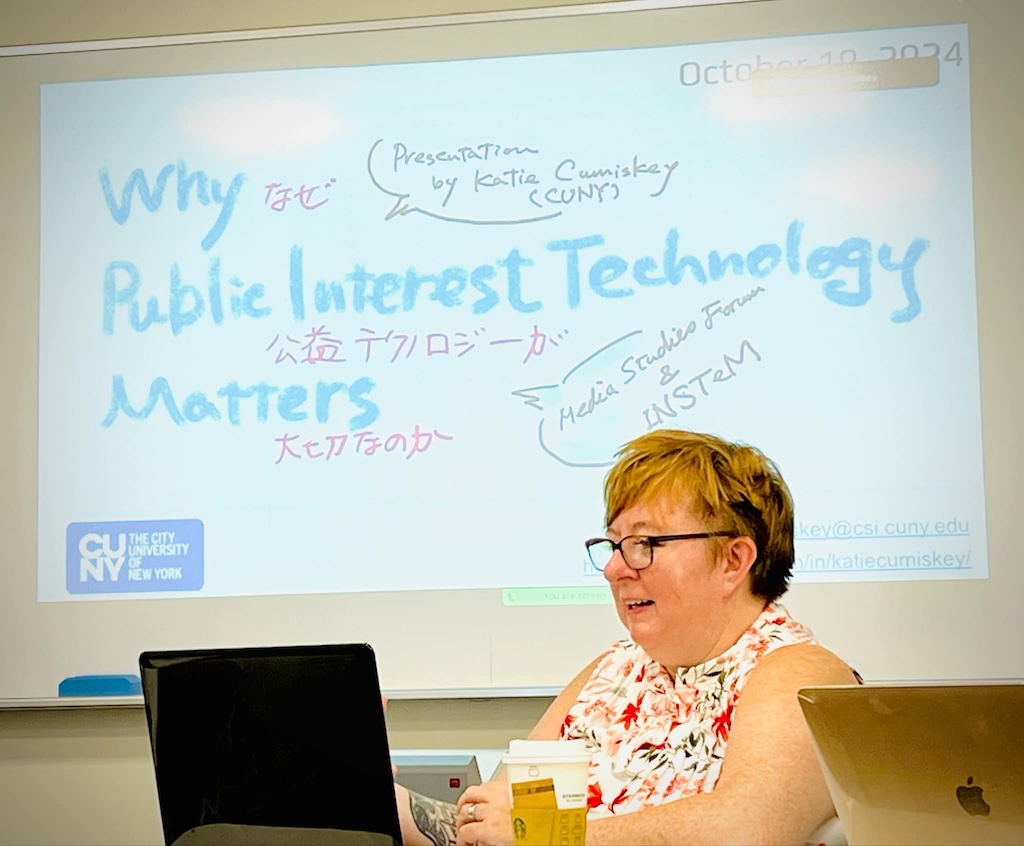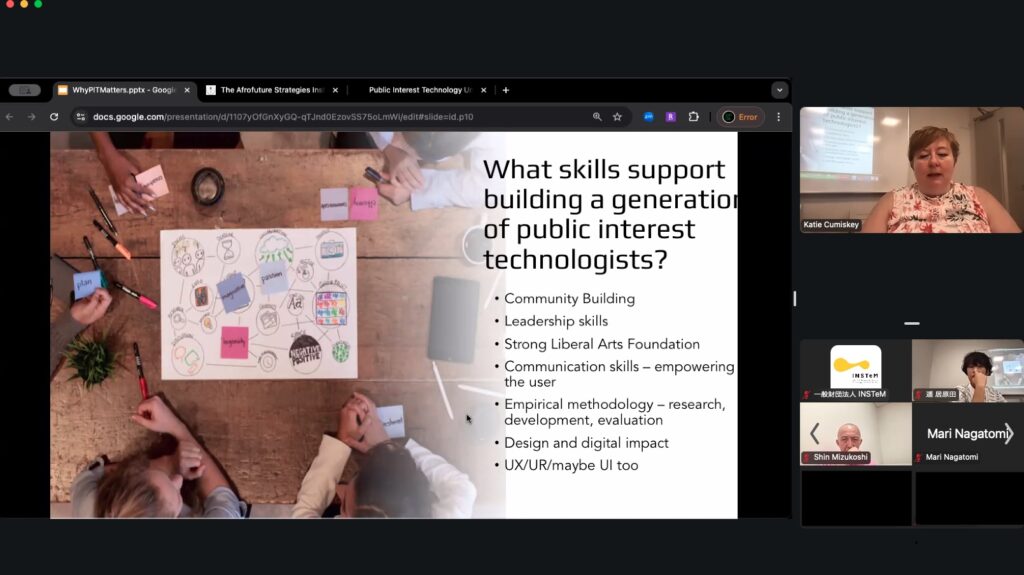[Seminar] "Why Public Interest Technology Matters: A Cross-Cultural Exchange for Equitable and Inclusive Technology Development"
【研究会】「なぜ公益テクノロジーが大切なのか: その公正で包摂的な展開のための対話」
研究会報告/Seminar highlights

INSTeMは、2024年10月19日午後3時から5時半まで、研究会「なぜ公益テクノロジーが大切なのか:その公正で包摂的な展開のための対話("Why Public Interest Technology Matters:A Cross-cultural Exchange for Equitable and Inclusive Technology Development")」を関西在住のメディア研究者の交流の場であるメディアスタディーズ・フォーラムと共催した。
今回は、ニューヨーク市立大学(CUNY)の社会心理学者で、モバイル・メディアをはじめとする情報技術と人間や社会の関わりをめぐる研究に取り組んできたキャスリーン・カミスキー教授(以下、ケイティさん)をメインスピーカーにお招きした。ケイティさんはサバティカルの今年、東京大学大学院情報学環・佐倉統研究室の国際研究員として約6週間日本に滞在した際に、長年の友人である筆者(水越)のいる大阪を訪ねてくれた。この機会に彼女が携わってきた「公益テクノロジー」(Public Interest Technology:PIT)という、北米の大学をネットワークした活動について語ってもらうこととなった。
司会は、アメリカ文化とポピュラー音楽研究の永冨真梨准教授(関西大学)、討論者は、アジア圏のアートや文化のキュレーター、アクティビストである居原田遥さん(東京藝術大学)、そして水越というメンバーだった。本研究会は対面とオンラインのハイブリッド形式をとり、ケイティさんのプレゼンテーションは英語で行われ、ディスカッションと質疑応答は英語と日本語を交えた。
ケイティさんの報告によると、「公益テクノロジー」とは、情報技術の社会的インパクトを考慮して、公益のためになる技術的ツールやリテラシーの育成を目的とした新しい学際的な領域とそれを推進する活動であるという。よく似た取り組みにシビックテック(Civic Tech)があるが、シビックテックが政府や政策に参画するための技術的活動であるのに対して、公益テクノロジーは、社会的平等や正義を実現するために情報技術をいかに活用するかについて、政府だけではなく社会のあらゆる領域で考え、実践していくための理論と実践である。アメリカのリベラル系シンクタンクのNew America(ニューアメリカ)が2019年から推進しており、現在、全米59の大学と4つの海外機関で公益テクノロジーの推進を目的とするコンソーシアムが作られている(Public Interest Technology University Network: PIT-UN)。
ケイティさんが所属するCUNYはこのコンソーシアムの一端を担っており、情報技術から疎外され、周縁に置き去りにされがちな人々を念頭に、カリキュラムや学習プログラムを開発し、さまざまな外部組織との連携を深め、公益テクノロジーを世に紹介する活動を展開している。ニューヨーク市では、たんなる技術教育ではなく、公益的なマインドを持った技術者や、多様な人々とのコミュニケーション能力とリーダーシップを持つ人々を養成し、公益テクノロジーの社会還元とプロモーションなどをおこなう地域拠点を設営することで、コミュニティの持続的発展をも射程に入れたような、学際的で、産官学連携的な活動が展開されているとのことだった。

ケイティさんの報告を受けての質疑応答は、まずは公益、すなわちパブリック・インタレストという理念とテクノロジーを結びつけた活動を、地域コミュニティに根ざして展開するという発想自体が示す、ある意味でのアメリカらしさ、アメリカの懐の深さに対する感銘の声から始まった。
その後、公益テクノロジーが目指すことがらとメディア・リテラシーの関わり、社会的多様性と正義の理念の関係性、この活動自体が持つ可能性と課題などについて活発な議論が交わされた。最後には、日本におけるこの領域の可能性や課題、数週間後に迫っていたアメリカ大統領選挙の結果が公益テクノロジーのゆくえにもたらすであろう影響などにも話題は拡がった。
議論を重ねることで、北米では、GAFAMに代表されるビッグテックが発達して世界を席巻し、さまざまな軋轢を生み出している一方で、公益テクノロジーのようなネットワークが一定の対抗力を保ち続けていることがわかった。そのことを日本、あるいは東アジアの文脈に置き換えた場合、私たちになにが可能かという課題とともに、その課題に向けたいくつかのアプローチの可能性を、この研究会は私たちにもたらしてくれたといえる。
当日は雨交じりの天候で、会場の関西大学梅田キャンパス7階705号室での対面参加者は少なかったものの、オンライン参加者と合わせて約25名の方々が参加された。
(INSTeM研究部サブディレクター 水越伸)

Seminar: “Why Public Interest Technology Matters: A Cross-cultural Exchange for Equitable and Inclusive Technology Development”
INSTeM on October 19th co-hosted a seminar entitled "Why Public Interest Technology Matters: A Cross-Cultural Exchange for Equitable and Inclusive Technology Development” with the Media Studies Forum (MSF), a group of media scholars from universities in the Kansai region. This seminar explored the potential of Public Interest Technology (PIT) to address social equity and justice through technology.
Our main speaker was Professor Kathleen M. Cumiskey from the City University of New York, a social psychologist researching the relationship between information technology and society. Professor Cumiskey, who was in Japan on sabbatical at the University of Tokyo’s Graduate School of Interdisciplinary Information Studies, provided an introduction to the emerging field of Public Interest Technology, which she has been actively involved in developing.
Moderating the hybrid seminar was Associate Professor Mari Nagatomi of Kansai University, an expert in American culture and popular music studies. The discussants were Haruka Iharada, a Ph.D. candidate at Tokyo University of the Arts who works as an activist and curator of art and culture in Asia, and Professor Shin Mizukoshi of Kansai University.
Professor Cumiskey described Public Interest Technology (PIT) as an interdisciplinary initiative aimed at developing tools and fostering digital literacy to serve the public good. Unlike Civic Tech, which primarily focuses on enabling public participation in government and policy, PIT seeks to use technology across various sectors of society to promote social equity and justice. Led by the American think tank New America, PIT has brought together 59 U.S. universities and 4 international institutions in a consortium called the Public Interest Technology University Network (PIT-UN) to advance this mission.
As a PIT-UN member, CUNY’s program under Professor Cumiskey’s leadership, is developing curricula and learning programs for communities with limited access to technology. By collaborating with New York City and external organizations, the program aims to cultivate professionals with a public-interest mindset and strong communication and leadership skills to engage diverse communities. This approach is designed to foster sustainable community development through partnerships among industry, government, and academia.
The ensuing discussion included admiration for the concept of connecting “public interest” with technology and implementing these practices within local communities. A lively conversation followed, covering topics such as the relationship between PIT and media literacy, the principles of justice in a diverse society, and the challenges and potential of PIT initiatives. In closing, the conversation broadened to explore the prospects and challenges of this field in Japan, as well as the potential impact of the upcoming U.S. presidential election on the future of Public Interest Technology.
Through these discussions, it became clear that while major tech companies like GAFAM dominate the industry and present various societal challenges, initiatives like Public Interest Technology offer a valuable counterbalance. Reflecting on these ideas in a Japanese and East Asian context, the seminar provided insights into potential local approaches to PIT and avenues for addressing relevant social challenges.
The in-person attendance at Kansai University's Umeda Campus, Room 705 was small, but the hybrid seminar brought around 25 people in total.
(Shin Mizukoshi, INSTeM Research Division Sub-director)
